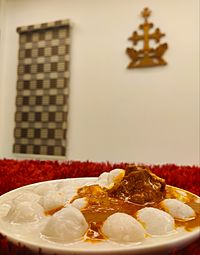Pidiyum kozhiyum facts for kids

Pidi and Kozhi
|
|
| Place of origin | India |
|---|---|
| Region or state | Kerala |
| Associated national cuisine | India |
| Created by | Knanaya Community |
| Main ingredients | Grated coconut, Chicken, rice flour |
Pidiyum Kozhiyum is a special traditional dish from Kerala, India. It is a favorite food of the St. Thomas Nasrani Christians, also known as Syro Malabar Christians. This tasty meal can be eaten for breakfast or dinner.
The name "Pidi" refers to a soft, whitish dish made from tiny boiled balls of finely ground rice. "Kozhi" in "Pidiyum Kozhiyum" means chicken curry. This curry is made with many traditional spices and ingredients. People often see this dish as a healthy choice. It is full of good things like fiber, protein, and carbohydrates.
The Story of Pidiyum Kozhiyum
This traditional dish has a long history. It started a very long time ago when Syrian Christians first came to Kerala. This was around the year 50 AD, led by St. Thomas. In those early days, Pidiyum Kozhiyum was a very expensive dish. Only wealthy families could afford to make it. This was because its ingredients were quite costly. This dish might have been inspired by other local foods like 'Kozhikkotta' or 'Panchara Unda'.
Why This Dish is Important to Faith
Pidiyum Kozhiyum is more than just food; it has a special religious meaning. It is blessed and served during a ceremony called 'Panthrandu Sleehanmaarude Nercha'. This means 'Feast of the Twelve Apostles'. It is a tradition for Syrian Jacobite Christians and Syro Malabar Christians.
During this ceremony, blessed food is given to twelve young boys. These boys are usually under 15 years old. They represent the twelve apostles of Jesus Christ. The town of Piravom, which is a Christian town near the border of Ernakulam and Kottayam districts, is very famous for this dish and this special ceremony.
Pidiyum Kozhiyum Today
After India became independent, the Christian community in Kerala changed a lot. Their way of life, including how they dressed, spoke, ate, and celebrated weddings, was influenced by Western cultures. Many old traditions passed down through generations were sometimes forgotten.
Pidiyum Kozhiyum also faced this change. It became less common and was rarely served at Christian events. However, over time, people started to bring back their cultural traditions. Now, Pidiyum Kozhiyum is made again in many families. It is served at important events like weddings, religious ceremonies, and festivals. It is a delicious way to celebrate their heritage.
 | Anna J. Cooper |
 | Mary McLeod Bethune |
 | Lillie Mae Bradford |

